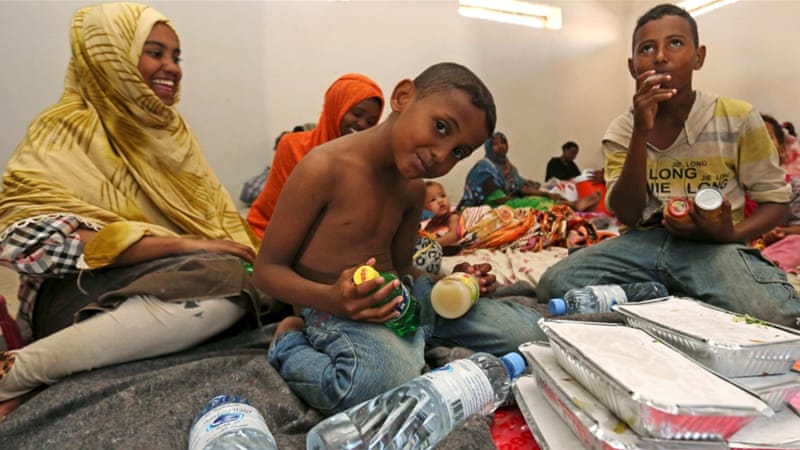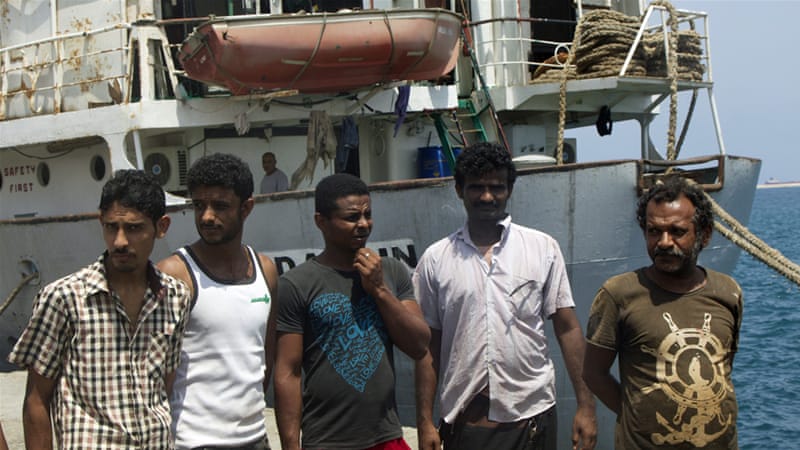In a temporary shelter made of corrugated iron and timber poles sit about 70 people, mostly women and children, hiding from the blistering mid-afternoon sun as hot, humid air blows in from the Red Sea. They have come to the port town of Berbera in Somalia’s breakaway Somaliland region to seek a respite from the Saudi Arabian-led air strikes in Yemen.
They have come to the port town of Berbera in Somalia’s breakaway Somaliland region to seek a respite from the Saudi Arabian-led air strikes in Yemen.
They are part of a stream of people who arrived by boat with thousands having landed at ports across the Horn of Africa region since the attacks began in late March.
With no aid agencies to welcome them, most have simply blended into the population.
Ahmed Hassan Hashi used the last bit of money he had to pay for the journey from Yemen to Berbera. It took him more than two days to cross the busy shipping lane to reach the Somali coast, the toll the journey took on his fragile body all too visible.

Heavy fighting between Shia rebels and coalition forces forced him out of his home in the Yemeni capital of Sanaa, where he had lived for the past 12 years.
He left in a hurry with his five children, his panic-stricken wife, and the few clothes he could grab. It was the second time in his life he had to escape war.
“Like rain the bombs were hitting everywhere. It was impossible to stay,” Hashi told Al Jazeera, rocking his heat-blister-covered seven-month-old baby in his arms to try and stop it from crying. “I went to Yemen running from the war in Somalia. I ran back to Somalia because of the war in Yemen. Somalia is much safer.”
Hashi worked as a labourer in Yemen but the bombs brought that to an abrupt end. Sitting next to him trying to feed their six-year-old daughter water – because there is nothing else to provide – is his wife, Jamila Ahmed.
“There is nothing to give them. I only have this water. They don’t want to drink it because the water is hot. This sun boils and burns everything,” Ahmed said.
Their children who were going to school in Yemen sit next to them, still in a state of shock by what they witnessed. All their life they had only known Yemen as home.
No money
Not far from the Hashi family, sits Roda Hassan, 25, alone with her legs crossed and face covered in a veil.
It is her first time in Somaliland, and with no relatives here she is worried, her dark brown eyes staring into the distance barely affording a blink.
“This town is expensive. I have no money to rent a place or buy food,” Hassan told Al Jazeera, blocking the sun’s rays from her eyes with her hand.
For her, life here is difficult but better than what she experienced in Yemen since the fighting started.
“Life changed after the first bomb dropped. Armed men started looting and shooting. They even raped some women. You could not move anywhere. I’m very lucky to have escaped with my life,” Hassan said.
Not recognised by the rest of world as a nation, Somaliland has welcomed thousands of refugees but that may change if the international community doesn’t step in to help this self-declared country.
“It will be impossible for us to cope if people continue coming. We are at full capacity,” Somaliland’s immigration commissioner, Colonel Mohamed Ali Yusuf, told Al Jazeera at his office in Hargeisa, capital of the breakaway region. “This is an international issue and, as such, the world needs to do more. We can’t deal with this on our own.”
With more than half of Yemen’s 22 governorates affected by coalition air strikes, the United Nations High Commissioner for Refugees said last month it was preparing to receive as many as 130,000 refugees by boat from Yemen to African countries, namely Djibouti and Somalia.
In Djibouti over the next six months, the UN’s refugee agency said it was making contingency plans to receive as many as 30,000 refugees. Djibouti is already home to nearly 15,000 people who fled Yemen.
In Somaliland and Puntland – a semi-autonomous region in northeastern Somalia – the UN said it has already started preparing to receive up to 100,000 war refugees.
Economic hit
Berbera is a historic trading port that connects the Horn of Africa to the Gulf countries and beyond. It is not only refugees who have been affected by the turmoil in Yemen.
Away from the temporary refugee shelter, traffic at the port has ground to a halt. Men stand idle with nothing to do.
With Gulf countries’ appetite for Somali livestock at an all-time high, millions of animals used to pass through the port destined for the Middle East, the main revenue generator for Somaliland. But fighting has delayed exports indefinitely.
The conflict couldn’t have come at a worse time for traders. It was the high season for animal exports with the Muslim Holy month of Ramadan less than a month away.
Standing on the dock next to the white-painted, Yemen-flagged Asal-Aldin ship practicing his Somali with his crew members is Yemeni national Ali Mohamed.
A father of seven, Mohamed, 45, is praying for the bombing to stop so he can resume his trade. His 22-crew ship used to travel between Yemen and Somalia at least four times a month. But since March, they have been stuck idle at Berbera port.
Every month his vessel used to transport at least 8,000 animals to Yemen. Now that is a distant memory.
“No work, my family is in Yemen. I have to earn money to support my family, but the war stopped us leaving Berbera,” Mohamed told Al Jazeera in broken Somali.
Just before the start of coalition air strikes, a much-needed expansion and maintenance work started on the port.
“The war has not been good to us. Financially it has affected us badly. Every day we don’t export animals or goods we lose a lot of money,” Ali Omar, Berbera port’s long-serving manager, told Al Jazeera.
With no sign of the Houthi rebels losing ground in Yemen and the coalition continuing its bombing, both refugees and traders are only left to hope and pray.
“If the bombs don’t kill my family then maybe they will die from lack of food, because without work I can’t buy them food,” said Mohamed.




























